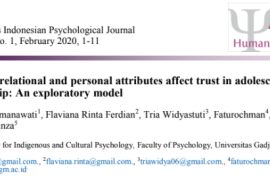ABSTRACT. Adolescence is a transition phase filled with doubt and instability. During these transitions, some obstacles are often perceived as more intense and frequently cause adolescents to feel sad. This study was aimed to identify how male and female adolescents perceived sadness. A total number of 461 students, 273 females and 188 males, all of whom were high school students in Yogyakarta, completed an open-ended questionnaire, developed by Kim and Park (2006). The data was categorized, open-coded, axial-coded, and later cross-tabulated. Results demonstrated that females perceive negative moments as a life-lesson (30.4%), self reflection (13.9%), disruption (13.6%), life’s obstacles (8.1%), motivation (6.6%), memorable moments (6.6%), and lastly as a spiritual-lesson (2.6%). While males view sadness as a life lesson (22.9%), disruption (15.4%), self-reflection (11.2%), motivation (9.6%), memorable moments (5.9%), life’s obstacles (5.3%), and lastly as a spiritual lesson (3.2%). This result was later divided into two types of perception, the positive approach, containing life lesson, self-reflection, motivation, and spiritual lesson, and the negative approach, which are sadness as disruption, memorable moments, and life’s obstacles. This study concludes that both Indonesian male and female adolescent mainly took a positive perception on sadness as a life lesson, with only 27% of them viewing it as negative.
Introduction: This article explores the phenomenon of massive corruption in Indonesia, from the perspectives of “mental health”, “spirituality”, and “leadership”. The extensive corruption in Indonesia becomes a contradiction, considering Indonesia is known as a country with largest number of Muslims in the world. Methods: This study used qualitative method through discourse analysis in trying to explain what is really happening? Why is the country that supposedly promoting religious, moral, and spiritual values; yet trapped in extensive “culture of corruption”? Why are the components of “mental health”, “spirituality”, and “leadership” important in the context of corrupt behaviors and corruption eradication efforts? What is the position of “mental health” if associated with corruption? Results: Specific behaviors of corruptors in Indonesia: repetitive pattern of lies and manipulative behavior; campaigning opposing corruption while doing it behind the curtain; smile, calm and composed, even after committing crime; showing no signs of remorse and degree of arrogance; surprised when sentenced; stating the belief in legal process, yet playing with the very same legal process. Conclusion: This study’s highlights “spirituality” as pivotal factor affecting the components of “mental health” also “leadership”; and ultimately influencing behavior of leaders. As a country with substantial “spiritual capital” of largest Muslim population in the world, it is time for “spirituality” to no longer dwell at level of “religious rituals”, but internalized deeper into values that transform behaviors of government officials/bureaucrats.
ABSTRACT. Leadership studies in Indonesia tend to discuss the way leadership affects individual attitudes and behavior as well as team effectiveness. However, a more contextual and recent approach study in understanding leadership remains underdeveloped. As a preliminary, this study aims to explore the concept of Indonesia’s leadership based on local perspectives by taking into account Implicit Leadership Theory. Data were gathered by involving 404 millennials (63,6% female, 36,4% male) using an open-ended question namely “Describe three characteristics of a leader” and two scales asking participants’ perception about how typical and effective each leaders’ characteristic count for leadership. A total of 1159 responses were analyzed using thematic analysis and demonstrated four characteristics depicting prototypes of leaders namely moral (41,07%), generally-competent (29,42%), charismatic (20,79%), conscientious (8,71%). A one-way ANOVA was also conducted to compare the effect of leader’s prototypes on perception of typicality and effectiveness of leadership. There was a significant effect of leadership prototypes on perception of typical leadership at the p<.05 level for the three conditions for each of perception about how typical and effective the prototypes reflect leadership. However, at the level of prototypes, no differences were found in perceiving which prototypes were considered as more typical and effective. The descriptive scores of each prototype indicates all of the prototypes were perceived as high in reflecting typicality and effectiveness in leadership. In conclusion, all leadership prototypes emerged from the responses were perceived as both typical and effective by the participants.
ABSTRACT. Trust is an important aspect in human relationship. According to previous research trust is influenced by 2 main attributes: personal (benevolence, integrity, and competence) and relational (support, closeness, and reciprocity) attribute. The study aimed to find a preliminary model to explain the association of personal and relational attributes in adolescent friendship. Two hundred and twenty participants (male=44.09% and female=55.91%) participated in the study. A survey method was used to collect the data. The design of this study was correlational design. Results from enter method in regression analysis show that six factors of personal and relational attributes influence trust at 44.5%. However, closeness had no significant influence on trust, so closeness was not included in the next analysis, the sequential analysis. The result shows that the relational attribute has higher influence on trust than personal attribute. Support and reciprocity factors which belong to relational attribute, has a higher contribution to trust in adolescent friendship than benevolence, integrity and competence – the latter three factors belonging to the personal attribute. Therefore building trust in friendship requires an emphasis on relational attributes of trust, especially that of support and reciprocity factors.




